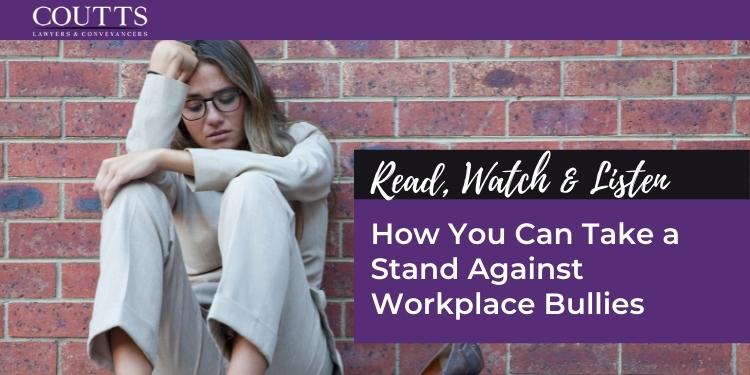KEY TAKE OUTS
- Section 789 of the Fair Work Act (The Act) contains a little-known remedy for employees who believe they are subject to workplace bullying.
- Under this section, an order can be sought from the Fair Work Commission to stop workplace bullying, where the employee believes they are subject to workplace bullying.
- To satisfy the requirements of bullying and to be capable of warranting an order under section 789 of The Act, the actions must be unreasonable, repetitive and create a risk to the health and safety of the employee.
- If a Fair Work Commission order is not suited to your situation, you may be entitled to a workers compensation claim.
When a worker believes that they are subject to bullying in the workplace, there are various avenues that can be taken to reach a solution. One of the avenues that can be taken, which is often overlooked, is an order from the Fair Work Commission under s 789FC – s 798FH of the Fair Work Act 2009 (“The Act”).
What is s 789 and when can it be engaged?
Under s 789FC of The Act, an application for an order to stop workplace bullying can be made where a worker reasonably believes that he or she has been bullied within their workplace. However, in order for the order to be made, the relevant standards of the bullying conduct must be met as follows:
- While the worker is at work in a constitutionally covered business:
- An individual; or
- A group of individuals;
repeatedly behaves unreasonably towards the worker, or a group of workers of which the worker is a member; and
- That behaviour creates a risk to health and safety.
It is extremely important to note that conduct is not considered to be “bullying conduct” in circumstances where reasonable management action has been taken in a reasonable manner.
Examples of reasonable management action may include:
- performance appraisal
- ongoing meetings to address underperformance
- counselling or disciplining a worker for misconduct
- modifying a worker’s duties including by transferring or re-deploying the worker
- investigating alleged misconduct
- denying a worker a benefit in relation to their employment, or
- refusing an employee permission to return to work due to a medical condition.
How to Apply for an Order
If an employee believes that all the relevant criteria mentioned above are met, he or she can apply to the Fair Work Commission to help stop the bullying by completing the applicable form, being Form F72, found on their website, and filing it with the Commission. There is also an applicable filing fee.
From this, a copy of the application will be provided to the employer and the person that you have alleged to have bullied you at work, to provide them with the opportunity to respond with a defence. Based on the circumstances of the case, the Commission will decide the best way to move forward to avoid escalating to court. Where matters do proceed to a hearing, the appropriate measures will be taken where necessary to prevent any further bullying.
Although it must be noted that when exercising these powers, the Commission cannot make any orders for a monetary penalty and thus compensation or fines cannot be awarded.
Recent Case Example
Recently in the Application by Ms Y [2021] FWC 6347, the Fair Work Commission examined this section (s 789 FC) and how it applies to these circumstances. Ms Y (“the Applicant”) was a HR Manager at a school (“the Respondent”) and applied for an order to stop bullying due to an alleged nine instances of unreasonable behaviour. The Respondent claimed that all instances were not bullying but rather reasonable management action which was carried out in a reasonable manner.
Among other things, the behaviour subject to the complaint comprised of:
- excluding the application from meetings in circumstances where organiser not aware applicant was entitled to attend
- and contacting third parties within the scope of job responsibility was not evidence of conduct undermining the applicant
- overlooking a single email request
- failure to provide a document in circumstances where applicant not entitled to said document
- decision not to support presentation created on applicant’s initiative
- directions by senior employees that overrode company policies
- requests for applicant to attend handover meetings in circumstances where applicant refused to perform the relevant work, and
- suspension of applicant’s work email account and direction to attend independent medical examination in circumstances where applicant was admitted to hospital following applicant’s receipt of a letter from employer outlining concerns about applicant’s conduct.
The Commission found that they were not satisfied that any of the incidents raised by the Applicant involved unreasonable behaviour by the persons named. They found that the legislation requires consideration of the reasonableness of the relevant conduct, and not the Applicant’s subjective perception of that conduct – resulting in the Commission finding that the Applicant had not been bullied within the meaning of s 789FD of the FWA. Therefore, the Commission did not have the power to make any of the orders sought by the Applicant and the matter was dismissed.
This case highlights the importance of differentiating between a reasonable disciplinary action and the very act of bullying as defined in the FWA. This does not mean however that you cannot pursue an application if disciplinary action has been taken, and if an employee believes they are subject to workplace bullying, it is best they seek legal advice as early as possible. The FWC will consider all relevant circumstances, including whether the disciplinary action itself is in fact reasonable as opposed to vexatious (which may potentially constitute bullying).
What are the other available avenues?
If an employee believes this isn’t the avenue that he or she would like to take, or if that employee would instead like to pursue monetary compensation, a workers’ compensation claim with possible work injury damages might be a better way for that employee to proceed.
Where workplace bullying has resulted in a toxic work environment it can have a detrimental effect on the health and well-being of the employee, such as severe psychological distress, sleep disturbances, anxiety, general ill-health, incapacity to work including reduced output and performance, and a loss of self-confidence. It is in these cases where an injury or illness has been suffered as a result of the bullying at work, that an employee may be entitled to a range of benefits under the workers’ compensation scheme.
Coutts Lawyers has an empathetic and approachable Injury Compensation team to assist you on a no-win, no-fee basis, and together with our employment law team, we are experienced in helping those bullied in their workplace achieve justice.
If you are an employee who believes you are being subject to workplace bullying, or if you are an employer who is concerned regarding a potential employee or may simply require a review of your workplace policies and procedures, please do not hesitate to contact our friendly injury compensation and employment law team today.
This blog is merely general and non-specific information on the subject matter and is not and should not be considered or relied on as legal advice. Coutts is not responsible for any cost, expense, loss or liability whatsoever in relation to this blog, including all or any reliance on this blog or use or application of this blog by you.



